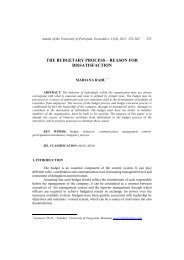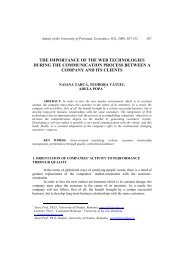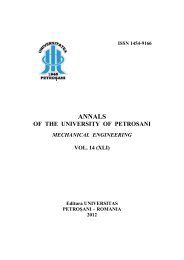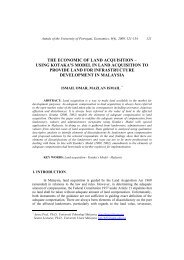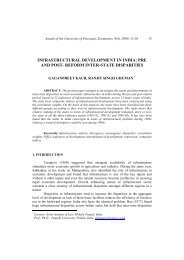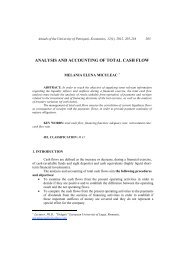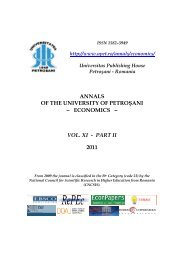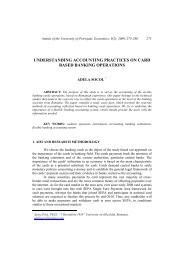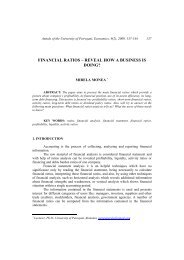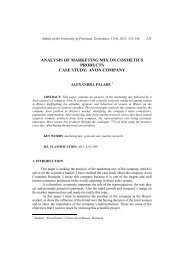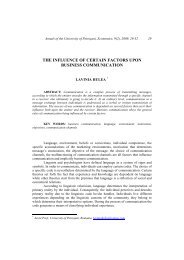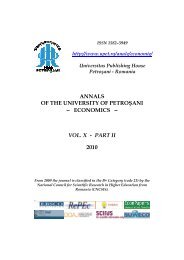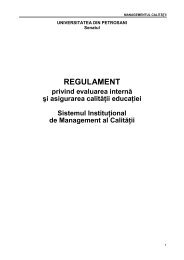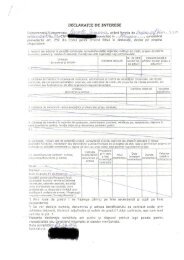annals of the university of petroÅani â¼ economics â¼ vol. xi - part i ...
annals of the university of petroÅani â¼ economics â¼ vol. xi - part i ...
annals of the university of petroÅani â¼ economics â¼ vol. xi - part i ...
Create successful ePaper yourself
Turn your PDF publications into a flip-book with our unique Google optimized e-Paper software.
The Role <strong>of</strong> <strong>the</strong> Internal Audit in <strong>the</strong> Tourism Unit’s Risk … 219<br />
active, continuous support and in<strong>vol</strong>vement in <strong>the</strong> risk management process<br />
such as <strong>part</strong>icipation on oversight committees, monitoring activities, and<br />
status reporting, to<br />
managing and coordinating <strong>the</strong> risk management process.<br />
Ultimately, it is <strong>the</strong> role <strong>of</strong> executive management and <strong>the</strong> audit committee to<br />
determine <strong>the</strong> role <strong>of</strong> internal audit in <strong>the</strong> risk management process. Management's<br />
view on internal audit's role is likely to be determined by factors such as <strong>the</strong> culture <strong>of</strong><br />
<strong>the</strong> tourism unit, ability <strong>of</strong> <strong>the</strong> internal auditing staff, and local conditions and customs<br />
<strong>of</strong> <strong>the</strong> country.<br />
The definition <strong>of</strong> internal auditing calls for "...a disciplined approach to<br />
evaluate and improve <strong>the</strong> effectiveness <strong>of</strong> risk management, control, and governance<br />
processes." Internal auditors have a key role to play in an tourism unit's risk<br />
management process in order to practice internal auditing in accordance with <strong>the</strong><br />
Standards. However, some tourism units may not have an established risk management<br />
process. This advisory seeks to provide internal auditors with guidance for determining<br />
<strong>the</strong>ir role in an tourism unit without an established risk management process.<br />
Risk management is a key responsibility <strong>of</strong> management. To achieve its<br />
business objectives, management should ensure that sound risk management processes<br />
are in place and functioning, Boards and audit committees have an oversight role to<br />
determine that appropriate risk management processes are in place and that <strong>the</strong>se<br />
processes are adequate and effective. Internal auditors should assist both management<br />
and <strong>the</strong> audit committee by examining, evaluating, reporting, and recommending<br />
improvements on <strong>the</strong> adequacy and effectiveness <strong>of</strong> management's risk processes.<br />
Management and <strong>the</strong> board are responsible for <strong>the</strong>ir tourism unit's risk management<br />
and control processes. However, internal auditors acting in a consulting role can assist<br />
<strong>the</strong> tourism unit in identifying, evaluating, and implementing risk management<br />
methodologies and controls to address those risks.<br />
Developing assessments and reports on <strong>the</strong> tourism unit's risk management<br />
processes is normally a high audit priority. Evaluating management's risk processesis<br />
different than <strong>the</strong> requirement that auditors use risk analysis to plan audits. However,<br />
information from a comprehensive risk management process, including <strong>the</strong><br />
identification <strong>of</strong> management and board concerns, can assist <strong>the</strong> internal auditor in<br />
planning audit activities.<br />
The chief audit executive should obtain an understanding <strong>of</strong> management's and<br />
<strong>the</strong> board's expectations <strong>of</strong> <strong>the</strong> internal audit activity in <strong>the</strong> tourism unit's risk<br />
management process. This understanding should be codified in <strong>the</strong> charters <strong>of</strong> <strong>the</strong><br />
internal audit activity and audit committee.<br />
If a tourism unit has not established a risk management process, <strong>the</strong> internal<br />
auditor should bring this to management's attention along with suggestions for<br />
establishing such a process. The internal auditor should seek direction from<br />
management and <strong>the</strong> board as to <strong>the</strong> audit activity's role in <strong>the</strong> risk management<br />
process. The charters for <strong>the</strong> audit activity and audit committee should document <strong>the</strong><br />
role <strong>of</strong> each in <strong>the</strong> risk management process.<br />
If requested, internal auditors can play a proactive role in assisting with <strong>the</strong><br />
initial establishment <strong>of</strong> a risk management process for <strong>the</strong> tourism unit. A more



